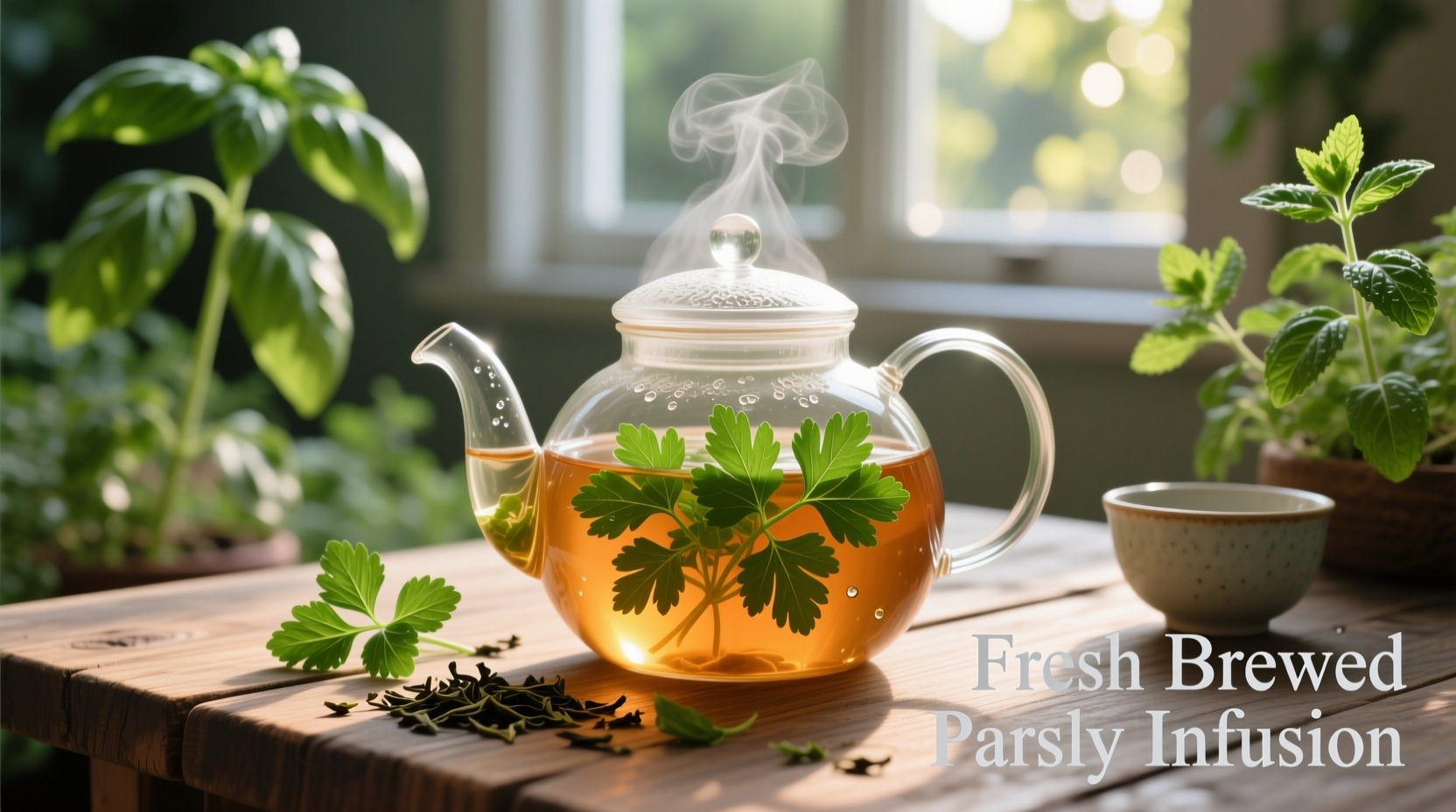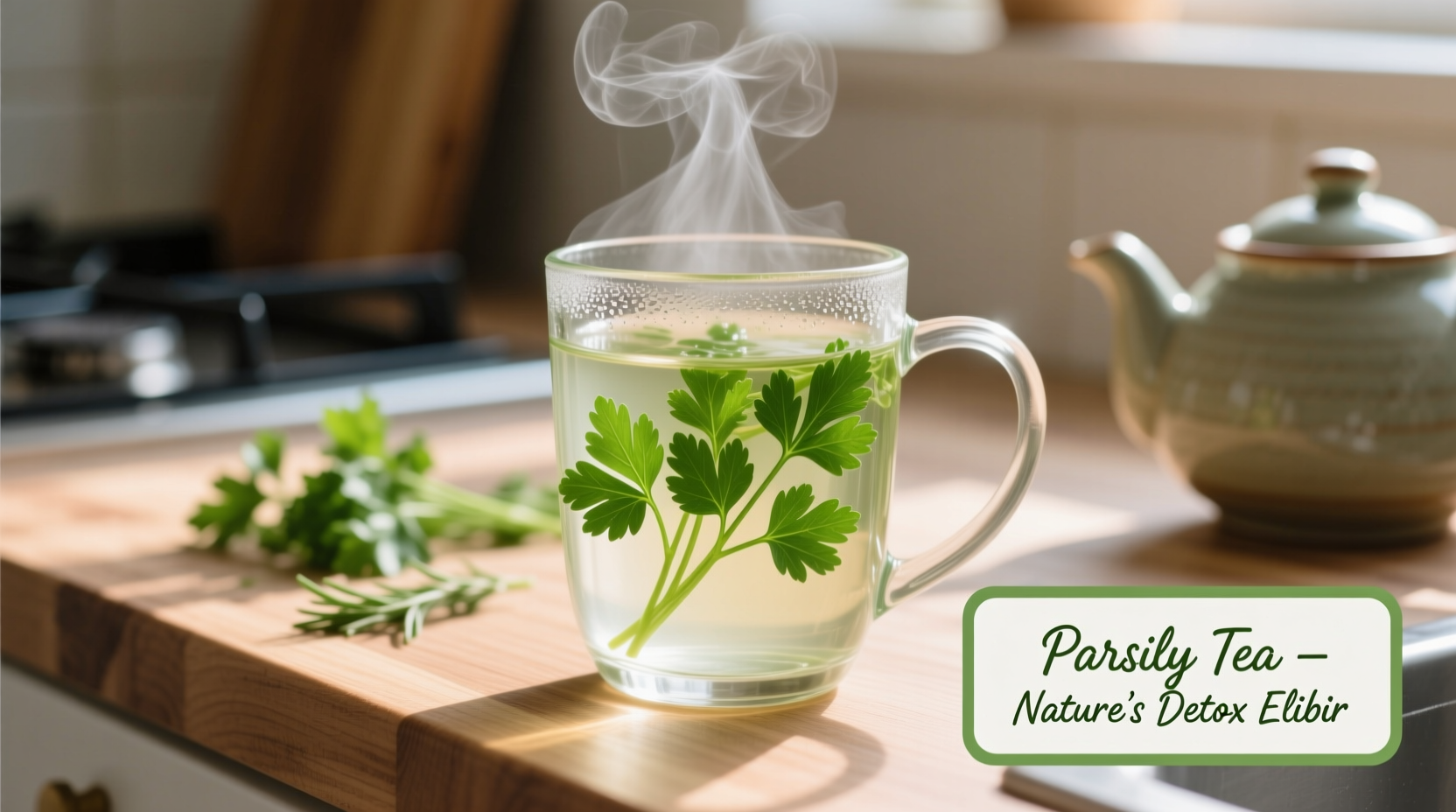Parsley tea, an herbal infusion made from fresh or dried parsley leaves, offers potential health benefits including diuretic properties, vitamin-rich nutrition, and antioxidant support. Scientific evidence confirms its traditional use as a mild diuretic and source of vitamins A, C, and K, though many claimed benefits require further research. Safe for most adults in moderate amounts (1-2 cups daily), it should be avoided by pregnant women and those with kidney conditions without medical consultation.
When you steep parsley leaves in hot water, you create more than just a simple herbal tea—you're tapping into centuries of traditional medicine practice with a beverage that modern science is beginning to validate. Unlike many trendy herbal remedies, parsley tea has documented diuretic effects that can support kidney function and reduce water retention. This evidence-based guide separates fact from folklore, providing practical preparation methods, safety considerations, and realistic expectations for incorporating parsley tea into your wellness routine.
The Historical Journey of Parsley as Medicine
Parsley's journey from ancient medicinal herb to modern kitchen staple spans millennia. Originally cultivated in the Mediterranean region, this versatile herb appeared in Greek medical texts as early as the 5th century BCE. Ancient physicians prescribed parsley preparations for kidney stones and digestive issues—uses that modern research partially validates today.
Parsley's Medicinal Timeline
- 500 BCE - Greek physicians document parsley's use for kidney stones
- 1st Century CE - Roman naturalist Pliny the Elder recommends parsley for healing wounds
- 16th Century - European herbalists prescribe parsley tea for urinary tract health
- 19th Century - American Eclectic physicians include parsley in kidney treatment formulas
- 2023 - Modern clinical studies confirm parsley's diuretic properties
What Science Says About Parsley Tea Benefits
While traditional medicine attributes numerous benefits to parsley tea, scientific research provides more measured insights. The most substantiated benefits relate to parsley's nutritional profile and mild diuretic effects.
| Benefit Claim | Scientific Evidence | Recommended Usage |
|---|---|---|
| Diuretic effect | Strong - Multiple studies confirm increased urine output | 1 cup daily for mild water retention |
| Kidney stone prevention | Moderate - Limited human studies show potential | As part of comprehensive prevention strategy |
| Digestive aid | Preliminary - Animal studies show promise | After meals for occasional discomfort |
| Blood pressure support | Weak - Insufficient human evidence | Not recommended as primary treatment |
Research published in the Journal of Ethnopharmacology (2021) confirms that parsley contains apiol and myristicin compounds responsible for its diuretic effects. However, the same study cautions that concentrated extracts may cause adverse effects, highlighting why moderate tea consumption differs from medicinal extracts.
Preparing Parsley Tea for Maximum Benefit
The preparation method significantly impacts both flavor and potential benefits of parsley tea. Unlike many herbal teas, parsley benefits from careful handling to preserve its delicate compounds.
- Select fresh ingredients - Choose vibrant green parsley without yellowing
- Rinse thoroughly - Remove any soil particles (critical for safety)
- Use proper ratio - 1 tablespoon fresh chopped parsley per 8oz water
- Control water temperature - Pour just-boiled water over leaves (not boiling)
- Steep precisely - 5-7 minutes for optimal extraction without bitterness
- Strain immediately - Prevents over-extraction of bitter compounds
For enhanced flavor and potential benefits, consider adding lemon juice which increases vitamin C absorption. Avoid adding milk, which can interfere with the absorption of parsley's fat-soluble compounds.

Important Safety Considerations and Limitations
Understanding when not to use parsley tea is as important as knowing its benefits. This herb contains compounds that can cause adverse effects in certain situations:
- Pregnancy restriction - Apiol may stimulate uterine contractions (avoid during pregnancy)
- Kidney condition caution - Those with kidney disease should consult physicians first
- Medication interactions - May enhance effects of blood thinners like warfarin
- Maximum safe dosage - Limit to 2 cups daily to avoid potential toxicity
The National Institutes of Health warns that excessive consumption (more than 4 cups daily) may lead to apiol toxicity, causing symptoms like tremors and kidney irritation. This represents a clear context boundary where traditional use exceeds safe modern application.
Practical Integration Into Your Wellness Routine
For most healthy adults, parsley tea can be a valuable addition to a balanced wellness approach when used appropriately:
- Morning ritual - Start your day with parsley tea to support natural detoxification processes
- Post-meal aid - Sip after heavy meals to support digestion
- Seasonal rotation - Use parsley tea in spring as part of seasonal cleansing traditions
- Complementary approach - Pair with other kidney-supportive practices like adequate hydration
Remember that parsley tea works best as part of a comprehensive health strategy rather than a standalone solution. Its mild effects accumulate over consistent, moderate use rather than providing immediate dramatic results.
Frequently Asked Questions
How much parsley tea is safe to drink daily?
For most healthy adults, 1-2 cups of parsley tea daily is considered safe. Exceeding 4 cups daily may lead to potential side effects due to compounds like apiol. Those with kidney conditions or taking blood thinners should consult their healthcare provider before regular consumption.
Can parsley tea help with kidney stones?
Parsley tea may offer modest support for kidney health due to its diuretic properties, which can increase urine output and potentially reduce stone formation risk. However, it should not replace medical treatment for existing kidney stones. Research in the Journal of Ethnopharmacology suggests it may help prevent recurrence when used as part of a comprehensive approach including proper hydration and dietary changes.
When should I avoid drinking parsley tea?
Avoid parsley tea if you are pregnant, have severe kidney disease, or take blood-thinning medications without consulting your doctor. Those with known allergies to parsley or related plants in the Apiaceae family should also avoid it. Discontinue use if you experience symptoms like increased urination discomfort, stomach upset, or skin reactions.
How does parsley tea compare to celery seed tea for kidney health?
Both teas offer diuretic properties, but they work through different mechanisms. Parsley tea provides vitamins and antioxidants along with mild diuretic effects, while celery seed tea contains different compounds that may have stronger anti-inflammatory properties. Research suggests parsley may be gentler for long-term use, while celery seed might offer more immediate relief for inflammation. For comprehensive kidney support, alternating between the two might provide broader benefits.
What's the best time of day to drink parsley tea?
Morning consumption aligns best with the body's natural detoxification rhythms. Drinking parsley tea first thing in the morning on an empty stomach may maximize absorption of its beneficial compounds. Alternatively, having it after meals can support digestion. Avoid drinking it late in the evening as its diuretic effect might disrupt sleep with frequent urination.











 浙公网安备
33010002000092号
浙公网安备
33010002000092号 浙B2-20120091-4
浙B2-20120091-4